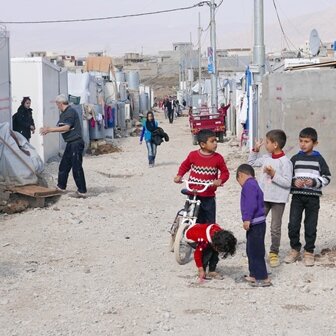Press releases
New international research project TRAFIG\Creative solutions to the challenge of forced displacement
With the new research project TRAFIG, BICC (Bonn International Center for Conversion) together with research partners from Europe, Africa and Asia, seeks to contribute to finding solutions to protracted displacement.

The new EU-funded project TRAFIG (Transnational Figurations of Displacement) will start in January 2019. TRAFIG introduces a novel perspective by focusing on refugees’ connectivity and mobility as a part of the solution rather than part of the problem of protracted displacement situations. “Our research project considers transnational and local networks as well as mobility as resources that displaced people use and upon which their resilience relies”, Benjamin Etzold, TRAFIG project leader at BICC, explains.
Through comparative empirical research in refugee camps and cities in Asia, Africa, and Europe, TRAFIG will analyze why displaced people live in vulnerable situations in host countries, how they sustain their livelihoods as well as how policy and humanitarian practice can better support their self-reliance. The project team will also trace refugees’ networks of interaction and support beyond their place of living and ask how these transnational connections shape their current situation and their future mobility trajectories. Last but not least, it seeks to better understand the relations between refugees and host communities and investigates the medium- and long-term economic impacts of displacement. “Doing so, TRAFIG will provide academic evidence and more robust data on refugee movements and protracted displacement” Benjamin Etzold underlines.
Based on the findings of the project, a rapid assessment tool will be developed to support policymakers and practitioners in enhancing the self-reliance of displaced people as well as host–refugees relations through tailored programming and policy development.
“With our innovative research and our rapid assessment tool, we not only seek to improve knowledge on protracted displacement and refugees’ transnational lives but also truly hope to contribute to improving policies and humanitarian programmes and thereby towards reaching the goals of the Global Compact on Refugees”, Benjamin Etzold describes the project’s goals. For this, the 11 research partners from Austria, Ethiopia, Germany, Greece, Italy, Jordan, the Netherlands, Norway, Pakistan, the United Kingdom will closely cooperate with key stakeholders throughout the entire life cycle of the project.
BICC is coordinating the three-year project. The partners in this excellent interdisciplinary and international research consortium are Addis Ababa University in Ethiopia, Aristotle University of Thessaloniki in Greece, Chr. Michelsen Institute (CMI) in Norway, International and European Forum on Migration (FIERI) in Italy, International Centre for Migration Policy Development (ICMPD) and Danube University Krems in Austria, Society for Human Rights and Prisoners' Aid (SHARP) in Pakistan, Sussex Centre for Migration Research in the United Kingdom, Leiden University in the Netherlands, and Yarmouk University in Jordan.
Press release "Neues internationales Forschungsprojekt TRAFIG \ Kreative Lösungen für die Herausforderungen durch Flucht und Vertreibung" (pdf, in German)
Press release "New international research project TRAFIG\Creative solutions to the challenge of forced displacement" (pdf, in English)
Through comparative empirical research in refugee camps and cities in Asia, Africa, and Europe, TRAFIG will analyze why displaced people live in vulnerable situations in host countries, how they sustain their livelihoods as well as how policy and humanitarian practice can better support their self-reliance. The project team will also trace refugees’ networks of interaction and support beyond their place of living and ask how these transnational connections shape their current situation and their future mobility trajectories. Last but not least, it seeks to better understand the relations between refugees and host communities and investigates the medium- and long-term economic impacts of displacement. “Doing so, TRAFIG will provide academic evidence and more robust data on refugee movements and protracted displacement” Benjamin Etzold underlines.
Based on the findings of the project, a rapid assessment tool will be developed to support policymakers and practitioners in enhancing the self-reliance of displaced people as well as host–refugees relations through tailored programming and policy development.
“With our innovative research and our rapid assessment tool, we not only seek to improve knowledge on protracted displacement and refugees’ transnational lives but also truly hope to contribute to improving policies and humanitarian programmes and thereby towards reaching the goals of the Global Compact on Refugees”, Benjamin Etzold describes the project’s goals. For this, the 11 research partners from Austria, Ethiopia, Germany, Greece, Italy, Jordan, the Netherlands, Norway, Pakistan, the United Kingdom will closely cooperate with key stakeholders throughout the entire life cycle of the project.
BICC is coordinating the three-year project. The partners in this excellent interdisciplinary and international research consortium are Addis Ababa University in Ethiopia, Aristotle University of Thessaloniki in Greece, Chr. Michelsen Institute (CMI) in Norway, International and European Forum on Migration (FIERI) in Italy, International Centre for Migration Policy Development (ICMPD) and Danube University Krems in Austria, Society for Human Rights and Prisoners' Aid (SHARP) in Pakistan, Sussex Centre for Migration Research in the United Kingdom, Leiden University in the Netherlands, and Yarmouk University in Jordan.
Press release "Neues internationales Forschungsprojekt TRAFIG \ Kreative Lösungen für die Herausforderungen durch Flucht und Vertreibung" (pdf, in German)
Press release "New international research project TRAFIG\Creative solutions to the challenge of forced displacement" (pdf, in English)


